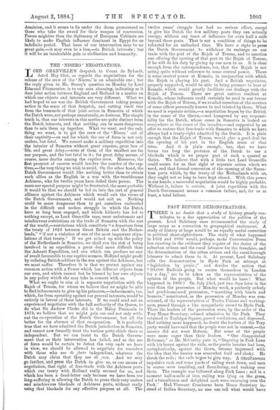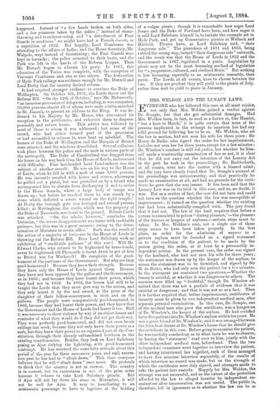PAST REFORM DEMONSTRATIONS.
THERE is no doubt that a study of history greatly con- tributes to a due appreciation of the politics of the present. Lord Salisbury once recommended the study of large maps as a correction to geographical excitement. A study of history at large would be an equally useful correction to political short-sightedness. The study of what happened in 1832 and 1866 would, perhaps, make Conservative Peers less exacting in the evidence they require of the desire of the suburban artisan and the rural labourer for the franchise, and the determination of the urban artisan and the rural-borough labourer to admit them to it. At present, Lord Salisbury calls the demonstration in Hyde Park an attempt at "legislation by picnic ;" and derides the notion that "30,000 Radicals going to amuse themselves in London for a day," are to be taken as the representatives of the opinion of the people. But what would he have ? What happened in 1866? On July 23rd, just. two days later in the year than the procession of Monday week, a perfectly orderly and good-humoured procession, "marching with bands and banners," constituted, as the procession of Monday was con- stituted, of the representatives of Trades Unions and working- men, passed through a like sympathetic crowd to Hyde Park. There the leaders of the procession were, by the order of the Tory Home Secretary, refused admission to the Park. They returned to Trafalgar Square, passed resolutions, and dispersed. Had nothing more happened, no doubt the leaders of the Tory party would have said that the people were not in earnest,—the masses did not want Reform. But some of the people were more eager than their leaders. "One disappointed Reformer," as Mr. McCarthy puts it, "lingering in Park Lane with his breast against the rails, as the poetic heroine had hers, metaphorically, against the thorn, became impressed with the idea that the barrier was somewhat frail and shaky. He shook the rails ; the rails began to give way. A simultaneous impulsive rush and some yards of railing went down, and men in scores were tumbling, and floundering, and rushing over them. The example was followed along Park Lane ; and in a moment half-a-mile of iron railing was lying on the grass, and a tumultuous and delighted mob were swarming over the Park." Had Viscount Cranborne been Home Secretary in- stead of Indian Secretary, no one can tell what would have
happened. Instead of "a few heads broken on both sides, and a few prisoners taken by the police ;" instead of stone. throwing and truncheon-using, and "a detachment of Foot Guards in readiness," we might have had a French inteute, or a repetition of 1832. But happily, Lord Cranborne was attending to the affairs of India ; and the Home Secretary, Mr. Walpole, wept instead of threatening ; the Foot Guards were kept in barracks ; the police returned to their beats, and the Park was left in the hands of the Reform League. Then Mr. Disraeli began to educate his party. In 1867, this education of the Tories was complete, with the exception of Viscount Cranborne and one or two others. The destruction of Hyde Park railings was evidence enough for Mr. Disraeli and Lord Derby that the country desired reform.
It had required stronger evidence to convince the Duke of Wellington. On October 8th, 1831, the Lords threw out the Reform Bill. "On the 12th of October," says Mr. Molesworth, "an immense procession of delegates, including, as was computed, 60,000 persons, almost all of whom were male adults, marched to St. James's, to present an address to the King. It was de- livered to his Majesty by Mr. Hume, who announced its reception to the petitioners, and exhorted them to disperse peaceably and return home. This advice was followed by most of those to whom it was addressed ; but some of the crowd, who had either formed part of the procession or had assembled to witness it, were bent on mischief. The houses of the Duke of Wellington and the Marquis of Bristol were attacked, and the windows demolished. Several collisions took place between the police and the mob in various parts of the metropolis. The Duke of Cumberland was dragged from his horse on his way back from the House of Lords, and rescued with difficulty. Poor hot-headed Lord Londonderry was the subject of another assault. He was on his way to the House of Lords, when he fell in with a mob of some 4,000 persons.
He was instantly assailed with hisses and stones, whereupon he pulled out a pistol, but was prevailed on by a friend who accompanied him to abstain from discharging it and to retire to the Horse Guards, where a large body of troops was drawn up ; but before he reached them he was struck by a stone which inflicted a severe wound on the right temple." At Derby the borough gate was besieged and several persons killed ; at Nottingham the castle, which was the property of the Duke of Newcastle, was burnt to the ground. Belvoir Castle was attacked. "On the whole, however," concludes the historian, "the severe disappointment was borne with creditable patience, but this was in a great measure owing to the deter- mination of Ministers to retain office." Such was the result of the action of a majority of forty-one in the House of Lords in throwing out the Reform Bill. Does Lord Salisbury wish an exhibition of "creditable patience" of this sort ? Will Mr.
Edward Clarke, who refuses to be frightened by brass-bands, never be frightened till Plymouth is burnt down to get at him as Bristol was for Wetherell ? He complains of the good- humour of the partisans of the Government. But why are they good-humoured ? Because they know their strength. Because they have only the House of Lords against' them. Because they have not been opposed by the police and the Government, as in 1866; and because they have learnt their power, which they had not in 1832. In 1832, the lesson had still to be taught the Lords that they must give way to the nation, and they only learnt it by fire and sword, at the price of the slaughter of their fellow-countrymen in riots and on the gallows. The people were comparatively good-humoured in 1866, because they had learnt their power, and they knew that the Government and the House of Lords had learnt it too. Still it was necessary to show violence by way of an object-lesson and reminder of what they would do if they did not get their way. They were perfectly good-humoured, and did not even break railings last week, because they not only knew their power as a mob, but they knew their power as an organised part of the Con- stitution, through their already enfranchised brethren in the existing constituencies. Besides, they look on Lord Salisbury posing as Ajax defying the lightning, with good-humoured contempt. He has assumed the same lofty attitude about this period of the year for three successive years. and each succes- sive year he has had to "climb down." This time everyone believes that he will "climb down" once more. He pretends to think that the country is not in earnest. The country is in earnest, but its earnestness is not of the grim order because it refuses to take Lord Salisbury grimly. But if Ajax will not lay down his arms in November, it will not be well for Ajax. It may be humiliating to an aristocratic personage to have to legislate at the bidding of a vulgar picnic ; though it is remarkable how eager Lord Jersey and the Duke of Portland have been, and how eager it is said Lord Salisbury himself is, to imitate the example set in Hyde Park, and get up Conservative picnics at Welbeck and Hatfield. Picnics have, as Lord Salisbury said, " their dangerous side." The picnickers of 1831 and 1866, being rubbed the wrong way, turned "their dangerous side" outwards, and the result was that the House of Lords in 1832 and the Government in 1867, legislated in a panic. Legislation by picnic may not be the most becoming method of legislation for "a progressive, cultured, and civilised State." But nothing is less becoming, especially to an aristocratic assembly, than panic. The Lords, at all events, have to choose between the two. If they are prudent they will yield to the picnic of July, rather than wait to yield to panic in January.



































 Previous page
Previous page